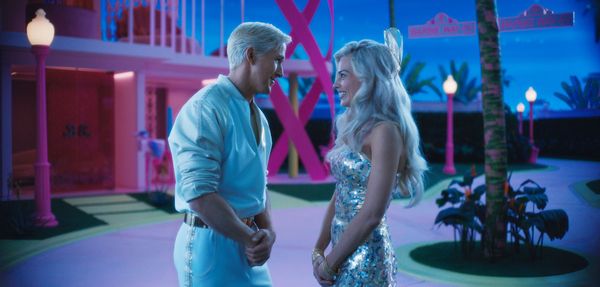From the ashes of the explosive box office debut of Greta Gerwig's "Barbie," think pieces have emerged about who the titular figure really is. Some argue that she's a subversive feminist. Others have even made the case that she's a communist. But now, the movie has stirred up a new conversation that Barbie is in fact an asexual icon.
Barbie doesn't have sex. And, more importantly, she's not driven to seeking it.
As the movie follows its titular figure from Barbieland into the real world, and thus her eventual transition from doll to human, Barbie (Margot Robbie) remains consistently disinterested in Ryan Gosling's Ken. She neither wants to sleep with him nor be anywhere near him for that matter. In the beginning of the movie, he asks if he can sleep over (and presumably with) Barbie to which she refuses, saying, "Why? What for?" before happily enjoying a girls night. The punch line lands because they are children's toys with no reproductive organs. Why would they know what sex is? But this scene also hammers home a crucial point: Barbie doesn't have sex.
And, more importantly, she's not driven to seeking it. There's a distinct lack of attraction to sex within Robbie's character, hence why asexual Barbie truthers believe the character is ace (which, for the uninitiated, is someone who does not have an attraction to sexual activity). Despite being boyfriend and girlfriend (at least according to Ken) in the first half of the movie, Barbie has no desire to sleep with him or anyone for that matter, content to sleep by herself in her Dreamhouse where every night is girls night. She never kisses Ken or holds his hand. In fact, his very presence seems aggravating to her; she's often sighing at his appearance or having to make sure he's not getting into trouble. By the end of the film, she makes clear that she just wants to be friends with Ken. It's all very unromantic. Some may even say aromantic. (Though, to be clear, not all asexual people are aromantic, aka not attracted to romantic relationships.)
There is also of course the matter of Barbie being smooth down there, a point Gerwig makes explicit throughout the story. When Robbie and Gosling, decked in shiny matching rollerblade costumes, find themselves in the real world, they skate over to the construction workers where Barbie experiences the all too relatable catcall. "Are your pants made of mirrors?" one of the workers shouts. Actually, Barbie points out, "I don't have a vagina."
"If she doesn't have organs, she doesn't have reproductive organs. If she doesn't have reproductive organs, would she even feel sexual desire? No, I don't think she could," Robbie said in an interview with Vogue. While the movie may not outright say Barbie's sexual orientation, Robbie's comment lends credence to the idea that the figure is asexual as her attraction to sex is completely nonexistent.
 Ryan Gosling and Margot Robbie in "Barbie" (Warner Bros.)For Barbie, an enduring commercial icon in what is likely to be the biggest movie of the year, to be asexual is significant visibility for the ace community, especially as asexual representation on screen is few and far between. To date, there's only been a handful of asexual characters entertainment, like Todd Chavez in "Bojack Horseman," Peridot in "Steven Universe," Alastor in "Hazbin Hotel" and even Spongebob in "Spongebob Squarepants."
Ryan Gosling and Margot Robbie in "Barbie" (Warner Bros.)For Barbie, an enduring commercial icon in what is likely to be the biggest movie of the year, to be asexual is significant visibility for the ace community, especially as asexual representation on screen is few and far between. To date, there's only been a handful of asexual characters entertainment, like Todd Chavez in "Bojack Horseman," Peridot in "Steven Universe," Alastor in "Hazbin Hotel" and even Spongebob in "Spongebob Squarepants."
No one condemns Barbie for not wanting to sleep with or have an attraction to physical intimacy with Ken. It's quite the opposite.
But even when asexuality is finally depicted on screen, it often perpetuates harmful notions that asexuality is something that needs to be fixed. We see this in the 2012 movie "The Olivia Experiment," a comedy that follows the titular character as she comes to realize she's asexual only to then try to clear her "issues" by accepting a friend's offer to have sex with her boyfriend. A similar narrative runs throughout Season 8, Episode 9 of "House," when a patient (Corri English) tells the show's grumpy doctor House (Hugh Laurie) that she's asexual only for it to come out that she was lying in order to marry an asexual man who also turns out to not be asexual but merely had a tumor in his brain that made him believe that.
We need your help to stay independent
These depictions perpetuate the idea that asexuality is something that can be corrected like conversion therapy, asserting that asexuality is not a "real" sexuality. As Lauren Jankowski writes for Bitch, "The dangerous message that comes out of 'fix-it' narratives is that sexual orientation and consent is something people can debate. Convincing or shaming an asexual person into having sex even though they say they don't want to isn't a fun game — that's corrective rape, with the goal of 'fixing' asexuals."
As is often the case in pop culture, media representation has real life consequences. Because of fix-it narratives, many people who are asexual have a greater fear of coming out, particularly to medical professionals who often view a "low sex drive" as a symptom of a larger issue. Telling a doctor you're asexual is a quick way to be prescribed medication, as if this sexuality means there's something wrong with you.
"Barbie" thankfully diverges from this depiction. No one condemns Barbie for not wanting to sleep with or have an attraction to physical intimacy with Ken. It's quite the opposite. The movie celebrates how Barbie wants to become her own person, to become a real human with feelings and a job. Perhaps this is why Barbie ends up cheerfully going to the gynecologist by the end of the film, as someone who was never bullied into being sexual in Barbieland, she has no reason to fear the medical world.
Her journey to self-empowerment noticeably excludes a boyfriend or any significant other. Instead, the more Ken tries to press the issue of them being together, the more enamored with the patriarchy he becomes, the more annoying he becomes. The experience of being cajoled and convinced into conforming to default relationship standards is one asexual people know all too well. Margot sums this up nicely, continuing to tell Vogue that Barbie "is sexualized. But she should never be sexy. People can project sex onto her" — Just as people project fix-it narratives onto asexual people.
Want a daily wrap-up of all the news and commentary Salon has to offer? Subscribe to our morning newsletter, Crash Course.
Asexuality theory, like queer theory, seeks to create a view outside heteronormativity. If the latter focuses on romantic, monogamous love, the former asks you to rethink how you prioritize relationships, be they romantic, platonic, familiar or of the self. While the media likes to drive home this idea that women in particular should find The One, Barbie is a fabulous break from this narrative. Completely unattracted to sex or men, Barbie has her own Dreamhouse, her own car, her own life — and she's thriving. Ken, as the movie won't let you forget, is just . . . there.
It's right where he belongs because this Barbie is asexual, and life is still fantastic.



Shares